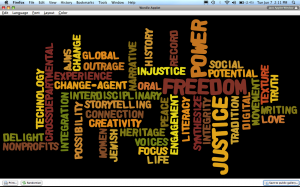 This is the first of a series of blog posts that will explore some of the amazing stories AJWS tells across its departments and with its grantees around the world. The hope is to stimulate a conversation that will help us tell better stories to advance social justice.
This is the first of a series of blog posts that will explore some of the amazing stories AJWS tells across its departments and with its grantees around the world. The hope is to stimulate a conversation that will help us tell better stories to advance social justice.
Nonprofits have shown a growing interest in using storytelling to promote social justice. Organizations such as Ashoka have created dedicated storytelling workshops for nonprofits, while PCI Media Impact trains nonprofits around the world in creative storytelling to inspire what it calls ‘enduring change.’ The nonprofit Breakthrough even developed an online video game to tell the story of unjust immigration detention policies. Then there are organizations run by professional storytellers, such as the PEN American Center, the literary and human rights organization, and Hirondelle, a nonprofit founded by journalists that supports community radio stations in conflict zones.
This is all well and good, but what is storytelling? It’s interesting that most organizations do not define the term. The feeling is that ‘you know it when you see it.’ But given the widespread interest in using storytelling at nonprofits, is it worth agreeing upon a definition to avoid its dilution into meaninglessness?
A survey of a few dictionary definitions reveals storytelling to be ‘the telling of stories.’ No surprise there. So what is a ‘story’? Most dictionaries define a story as a ‘narrative,’ and further define narrative as ‘a series of events.’ Is this what nonprofits mean when they say they use storytelling? That they want to tell ‘a series of events’? Sounds a little bland, doesn’t it?
I think the secondary definition of the word story better reflects what nonprofits are looking for: stories are meant ‘to amuse.’ It is this aspect, of amusement, that I would argue offers the most potential for storytelling for social justice. Amusement does not always mean making people laugh (though it can) but rather entertaining them. The story has to be interesting enough for the audience to pay attention.
So here is a loose definition: storytelling means telling stories that entertain.
But a social justice organization wants more than that, doesn’t it? The goal is not just to tell a story as entertainment, but to get the audience (the reader, the listener, the watcher, the experienc-er) to go out and do something. That could be whatever the organization thinks is necessary, from donating money to volunteering to pounding the pavement.
So here is a definition tailored to social justice: social justice storytelling means telling entertaining stories that get the audience to act.
You could substitute the word ‘engaging’ for ‘entertaining’, but I personally think it’s important not to lose the underlying quality of amusement in a good story.
Storytelling spans many diverse fields and carries many meanings but that doesn’t make it overly complicated. Stories are simple. We know them when we see them. The trick is to harness those stories in an effective way to make the world a better place. And to do so strategically.
There is a long tradition in Judaism about the power of stories. From the origin stories recorded in the Torah to the rabbinic stories of the Midrash and Talmud known as aggadah, Judaism views stories as a powerful way in which to teach, inspire and effect change.
AJWS is inspired by this tradition and uses storytelling to further its mission to empower the world’s marginalized people. Ethnic minorities, indigenous people, LGBTI people, and people simply standing up for what they believe is right are routinely excluded from politics, decision-making processes and determining their own futures. Even their own histories are denied them in text books and in the media. AJWS strives to help them tell their own stories on their terms.
Our service department also trains eager volunteers in storytelling for their overseas service missions and imbues our work with compelling narratives whenever possible—all with the desire to pursue tikkun olam (repairing the world).
And at our flagship office in New York City, we do plenty of storytelling and learning of our own. In 2010, AJWS conducted an in-depth textual study of a scholarly book about rights-based development and discussed it amongst the entire staff. This culminated in a siyum in which we told stories about what we’d learned through theatre, music videos and poems—a real celebration.
What storytelling has helped you promote social justice? Made up stories? ‘Real’ stories? How did you tell the stories? Books? Videos? Social media? We hope to hear from you and learn together.
Deji Olukotun is an attorney and a writer who explores the interplay between stories and change. He is currently working on a novel about a soccer referee in post-earthquake Haiti.
AJWS’s work in countries and communities changes over time, responding to the evolving needs of partner organizations and the people they serve. To learn where AJWS is supporting activists and social justice movements today, please see Where We Work.

